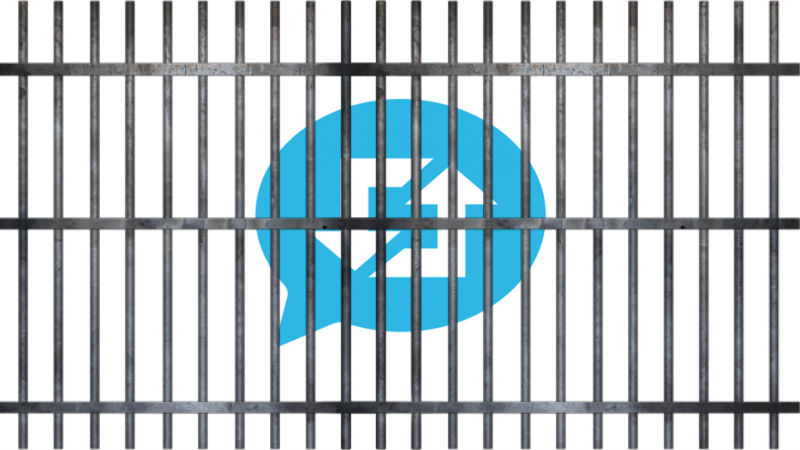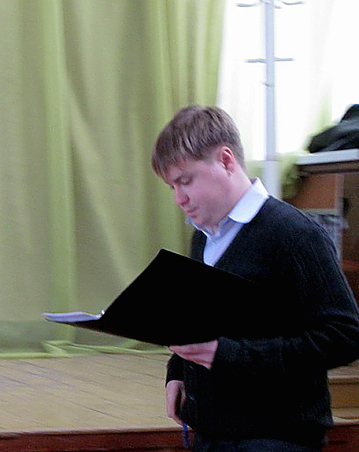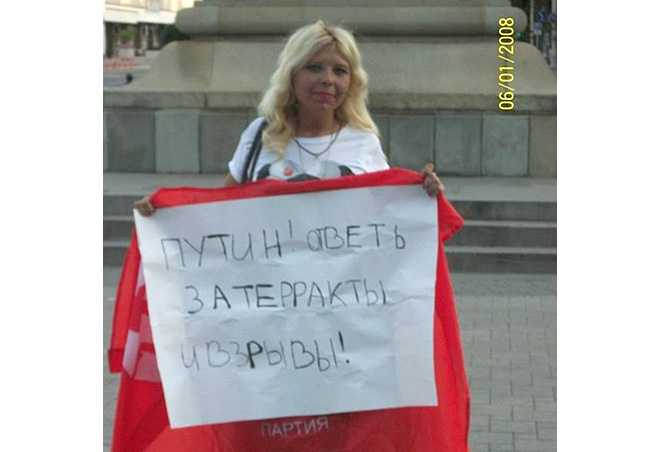
Images mixed by Tetyana Lokot.
Russia's crackdown on free expression online has been especially severe over the last twelve months, with legislators passing laws that directly threaten Internet user rights and abilities of tech companies to maintain open, privacy-protective platforms in Russia. Regulations signed into law thus far include the infamous blogger law, requiring anyone with over 3,000 daily views on their website to join a state registry and the data retention law (slated to come into power on September 1, 2015) mandating that all online services operating in Russia store Russian users’ data on servers inside the country.
But beyond these new laws, there are even more insidious ways that the Kremlin is stifling civic organizing and political dissent both offline and online.
According to a recent report by the Association of Internet Users, a Russian digital rights organization, the number of cases where citizens’ Internet freedom was limited in the country increased 1,5-fold in 2014 (from 1832 instances in 2013 to 2951 in 2014.) The authors of the report note that while the number of criminal cases filed concerning Internet activity actually dropped, they observed more extralegal administrative pressure on users (e.g., unofficial threats to fire or expel) and more restrictions on access to certain content online.
The report also notes that punishment for extremism-related crimes has become more severe. Charges of “incitement to extremism,” coupled with increasingly restrictive public assembly and unsanctioned protest regulations are what tends to land RuNet users in hot water. Even a retweet of an image or a republished post can cost Russian citizens unfettered access to the Internet—and their freedom.
RuNet Echo has collected some of the more resonant cases of Russian Internet users detained, investigated, and prosecuted for republishing content online. The majority of these cases involve comments and conversation on VKontakte, a popular Russian social network similar to Facebook.
Dmitry Semenov, Cheboksary
Dmitry Semenov reposted an image on his VKontakte page featuring Russian PM Dmitri Medvedev in a traditional North Caucasian headpiece with an Arabic caption roughly translated as “Death to the Russian snake.” Earlier in 2013, he had also reposted photos from a football (soccer) match, which depicted fans waving a flag with a swastika. He says that after he was issued administrative charges and a fine for the images, criminal charges followed.
Смысл текста, сопровождающего картинку, был в том, что пока госпропаганда говорит о защите русских на Украине, почему-то все молчат о правах русских в Туркменистане, на Северном Кавказе, то есть все разглагольствования о «русском мире» – это не более чем пыль в глаза для прикрытия действия российской власти на Украине.
The point of the text under the image was that state propaganda talks about protecting Russians in Ukraine, but everyone keeps mum about the rights of Russians in Turkmenistan, in the North Caucasus, so all this talk of “the Russian world” is nothing but a distraction from what authorities are doing in Ukraine.

Dmitry Semenov. Photo from VKontakte.
Legal proceedings:
On January 29 Semenov was visited by FSB officers who showed him the court-issued search warrant and said he was under criminal investigation for “public calls to extremist activity” under Part 1 of Article 280 of the criminal code, based on the fact that the image he reposted online contained “extremist content.” Semenov himself believes the criminal proceedings are connected to his civic and political activity, which had largely moved online in recent years.
Sentence:
The maximum sentence under Article 280 is four years in prison. When Semenov was formally charged and questioned as a suspect on February 2, he refused to testify since his lawyer was not present at the time. He was then banned from traveling outside the city and is waiting for further court proceedings.
Oksana Borisova, Saint Petersburg
Om January 23, Oksana Borisova, a student from St. Petersburg, reposted another user's post about an unsanctioned people's rally planned for January 26 in the town of Mineralnye Vody, in memory of a spec ops fighter Dmitry Sidorenko, who had recently been killed in a bar fight. On January 24, both the VKontakte group for the rally and the posts about it on Borisova's wall were blocked on orders from Roscomnadzor, the Russian telecom watchdog. Borisova's LiveJournal blog was blocked as well.
Legal proceedings:
On January 29, Borisova was detained as she attended classes at her university and arrested on charges of organizing an unsanctioned protest rally. The next day a local court found her guilty of “violating the order of organizing or holding a rally, march, demonstration or picket” (Part 2 of Article 20 of Russia's administrative violations code.)
Borisova told Novaya Gazeta she did not expect such attention—or such a harsh sentence.
В университет пришли пятеро сотрудников полиции. Я объясняла им, что завтра у меня экзамен, не отпустили. Отвезли в 32-й отдел полиции, досмотрели, составили протокол по статье 20.2 КоАП – за скрины из соцсети! Я даже не знала – такое реально вообще?!
Five police officers came to the university. I tried to explain to them that I had an exam tomorrow, but they wouldn't let me go. Took me to the 32nd police precinct, searched me, wrote up a protocol for Part 2 of Article 20 of the admin code—for screencaps from a social network! I don't even know—how can this be real?!
Sentence:
Borisova was sentenced to 24 hours of administrative arrest. Since she had already spent most of that time in a police headquarters, she was released shortly thereafer. Her lawyer, Tatyana Myzgina, told Novaya Gazeta the case has no basis in reality, since there was no event, place, or action where the “unsanctioned organizing” could have taken place. However, the judge had decided that “agigation, even in the form of a repost, constitutes organization.” Myzgina says they plan to appeal Borisova's sentence.
Darya Polyudova, Krasnodar
On April 4, 2014 Polyudova went on a single-person picket with a banner that said “Not war with Ukraine, but revolution in Russia! Not war, but revolution!” and later posted a photo of herself with the banner on her VKontakte profile page. On July 16, Polyudova reposted a text on her VK page that contained the words “People, wake up!.. Why can't we remove Putin, and then create a socialist revolution?!!! Enough sleeping! Time to go out to the square and topple this regime!” Polyudova herself says she only reposted others’ words and provided no comments of her own. On August 5, 2014 she posted another text on VKontakte calling “to fight Putin with his own weapons” and mentioning the Russian Kuban region as a historically ethnic Ukrainian territory.

Darya Polyudova. Photo from VKontakte.
Charges issued:
At the end of January, the FSB brought formal charges against Polyudova. The investigators found Polyudova violated parts 1 and 2 of Article 280 of the criminal code respectively, by “calling the public to violently overthrow the constitutional order of the Russian Federation” (also known as calls to separatism) and “calling publicly for extremist activity using the Internet telecommunication network.” Polyudova's lawyer says the charges are essentially based on expert analysis of the woman's posts and reposts on her social network accounts.
Sentence:
Both parts of the articles are classified by the criminal code as “crimes of average severity” and could get Polyudova a prison term of up to five years. Since August 2014, Polyudova has been in pre-trial detention. During this time, the language expertise of her posts and the court hearings took place. During the most recent court hearing, her detention was prolonged until February 28, while the investigation continues.
Andrey Teslenko, Barnaul
Teslenko republished a text on his VKontakte page called “A Russophobia Post” and signed by “Anonymous.” The post claimed that “Russianites are shit-people, beast-people, a cancer” and further criticized Russians for their actions in Ukraine. A friend of Teslenko's on VK asked him to delete the post, explaining that it was offensive to him. When Teslenko refused, the friend in question complained to the Prosecutor's office.
Teslenko, a liberal activist and a one-time candidate for the Barnaul city council, had already been fined in the fall of 2013 for “mass dissemination of extremist materials” when he reposted a video by Alexey Navalny, titled “Remind the Crooks and Thieves About Their 2002 Platform!” on VKontakte.
Legal proceedings:
On April 17, 2014 Teslenko was detained by four masked men as he exited his house. The anti-extremism department of the local interior ministry searched his home and confiscated computers, a telephone, USB flash drives, and a copy of Rostislav Antonov’s 2011 book about the Primorsky Partisans (a guerrilla group responsible for a series of attacks on police officers in 2010.) Teslenko was taken in for questioning and told he was being formally charged and facing a criminal investigation based on Part 1 of Article 282 of the criminal code, “incitement to hatred or violence, as well as violation of human dignity.”
The SOVA Center for Information and Analysis, a Russian nonprofit organization, examined the content and the charges against Teslenko. SOVA experts say Teslenko’s “Russophobic” post does have a “clearly anti-Russian bent (in an ethnic sense),” but believe the charges brought against the activist are dubious, since the post was shared with a small audience, was only a re-publication, and since it's unclear if calls to discrimination should be prosecuted when they were made in Russia, but addressed to the authorities of a foreign country. SOVA also note that the post did not contain any calls to violence, negating the investigators’ claims.
What lies ahead:
According to the criminal code, Teslenko could face up to five years in jail for violating Article 282. The day after he was charged, he left the city of Barnaul, along with his wife and 18-month old daughter. He first went to Novosibirsk, where he shaved off his beard and cut his hair, and then, before he was announced missing and wanted, flew to Kyiv. Teslenko and his family remain in Ukraine and are living in Mezhyhirya, the residence of former President Yanukovych, now refashioned as refugee housing. Teslenko says they were unable find work in Kiev and have plans to move to the US, after winning a green-card lottery.
Konstantin Zharinov, Chelyabinsk
Zharinov, a member of the Democratic Choice opposition party and the author of two books on the history of terrorist and extremist organizations, shared a post with his VKontakte friends in March 2014. The post quoted an address by the Ukrainian right-wing organization “Right Sector,” branded extremist in Russia. The organization's text said that Russia's fate was being decided in Ukraine, and that Russians now were also able to fight “Putin's Chekist regime.” The post called for mass protest actions, creating partisan groups, and blocking roads.
The next day Zharinov went to a single-person picket with a piece of paper that said “No to War”. On March 4 he was taken to the prosecutor's office by anti-extremist law enforcement officers. The historian claims the case against him is the result of “an absurdly oversized police force struggling to justify its own existence.”
Legal proceedings:
At first Zharinov was given a warning and cautioned not to violate the law. A month later he was called to the FSB for questioning. Two months later, he was facing a criminal case based on part 1 of Article 280, charging him with “public calls to extremist activity.”
Zharinov himself says his interest in “Right Sector” was strictly academic, but in their formal charge document, the investigators concluded that he “intentionally and deliberately found materials of oppositional nature online” and posted them to his page. One of the experts also noted that “there can be no accidental repost, since in order to achieve it one must perform a series of sequential variable actions.” Zharinov subsequently learned that the security service had wiretapped his phone and was listening to his conversations.
Sentence:
If Zharinov is found guilty of “public calls to extremist activity,” he will face up to four years in prison.
Stanislav Kalinichenko, Kemerovo
Kalinichenko, an opposition blogger, retweeted a photo taken on May 6, 2013 at Patriarshie Prudy in Moscow, of a leaflet that said “Stop going to rallies and start acting!” and was signed with “First resistance brigade.”
Legal proceedings:
In July 2013 Kalinichenko's home was searched as part of a criminal investigation which accused him of extremism: his hard drives, voice recorder and phone were all taken. The blogger himself, who was previously designated a witness in the case, was asked to proceed to the local security service headquarters for questioning, which he refused to do. On November 6, 2013 three security service officers in civilian clothes detained Kalinichenko and delivered him to a pre-trial detention facility. He has been formally charged with “public incitement of extremist activity” in violation of Article 280 of the criminal code. The human rights organization “Memorial” has analyzed Kalinichenko's case and found it to be “politically motivated” persecution. “Memorial” also said Kalinichenko's charges were selective, since over a hundred other users who also retweeted the photo had not been charged.
Станислав не был ни автором листовки, ни автором ее фотографии, его обвиняют лишь в ретвите сообщения, содержащего фотографию. Он не призывал к какой бы то ни было деятельности, но лишь разово распространил информацию. Поскольку листовка официально не была признана экстремистским материалом, на наш взгляд, нет оснований даже для административного преследования
[…]
Политический аспект преследования выражается в самом посягательстве на свободу распространения информации, явно связанном с ее оппозиционным содержанием. Этот случай уголовного преследования вписывается как в общую тенденцию „закручивания гаек“ — ограничения свободы высказывания в интернете […]
Stanislav was not the author of the leaflet, not the author of the photo, he is accused only of retweeting the message that contained the photo. He did not call to any activity, he only disseminated the information. Since the leaflet has not been officially recognized as extremist material, we believe there is no ground even for administrative persecution.
[…]
The political aspect of the case is in the violation of the freedom to share information, obviously connected to its oppositional nature. This criminal persecution case is an illustration of a larger trend of “tightening the screws”—limiting freedom of expression online […]
Sentence:
Kalinichenko could face a prison sentence of up to four years. The blogger is currently under a travel ban and is trying to sue the officials who had detained him. His first court hearing took place in November 2014, and no final sentence has been delivered so far. Meanwhile, activists following Kalinichenko's case are blogging about it on LiveJournal.



